Uncovering Rare Obesity®
If you think there’s more to your obesity and hunger, talk to your doctor about whether genetic testing is right for you.
If you think there’s more to your obesity and hunger, talk to your doctor about whether genetic testing is right for you.
Uncovering Rare Obesity is a program sponsored by Rhythm Pharmaceuticals to help identify rare genetic diseases of obesity. Eligible individuals can receive a genetic test and two genetic counseling sessions (one before and one after the test) at no charge. Participants are responsible for any doctor visit, sample collection, or other costs.
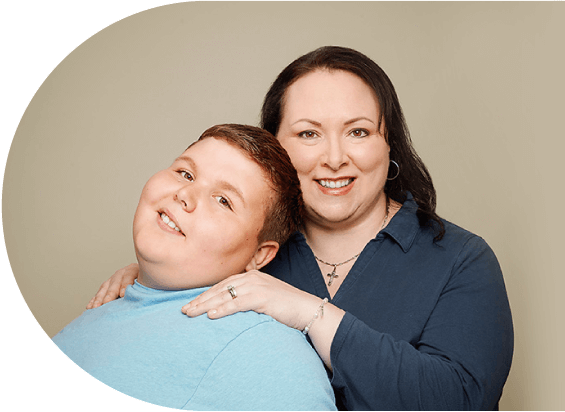
JOAN AND HER SON TYSEN,
who is living with POMC heterozygous deficiency
All obesity is not the same
Some forms of obesity are caused by variants or changes in your genes. Genes are your body’s instruction manual. They determine how your body grows, develops, and functions.
Changes in your genes can cause certain diseases, like rare genetic diseases of obesity. In these conditions, a key part of the brain responsible for controlling hunger doesn’t work properly and prevents the brain from telling the body that the stomach is full. Without this important signal, hunger is stuck in the “on” position.
Common symptoms
Individuals affected by rare genetic diseases of obesity can experience a range of symptoms, but two of the most common are:
-
Severe obesity that begins early in life (early-onset obesity)
Extreme weight gain early in childhood, usually before 5 years of age. This is typically far more weight than would be expected based on age, for instance a body mass index (BMI) greater than the 95th percentile.
-
Feelings of intense hunger that may never go away (hyperphagia)
A deep and overwhelming hunger that can make it difficult to focus on anything else. It can feel as though the body is always in search of food, even just after eating a meal.
Genetic testing may help your search for answers
If you experience these symptoms, genetic testing may provide useful information for you and your doctor including:
- Potential eligibility for clinical studies
- Appropriate disease management and care options
- A possible diagnosis
“Having a genetic test gave us answers. The diagnosis helped us understand that Drake’s challenges weren’t our fault, and they weren’t Drake’s fault.”
Denise, mom to Drake, living with a rare genetic disease of obesity
“The test was a simple swab. As hard as it was to hear the diagnosis, it was a relief to at least have an answer and to know that we were not imagining this and we weren’t doing anything wrong.”
Karen, mom to Uncovering Rare Obesity program participant living with LEPR deficiency
Understanding eligibility
A healthcare professional must order the test. To qualify for genetic testing through the Uncovering Rare Obesity program, you must be located in the United States or its territories, and be:
≤18
years of age
≥19
years of age
An immediate family member of select, previously tested patients
Showing clinical symptoms that suggest Bardet-Biedl syndrome (BBS), as the test may help provide additional evidence to support diagnosis
How it works
-
1Speak with your doctor
Your doctor will determine if genetic testing is right for you and if you are eligible for the test. This tool can help you prepare for that conversation. If you have questions before taking the test, contact a genetic counselor.
-
2Review and Sign consent forms
If your doctor determines that the test is right for you, your doctor will order the test, which can be conducted in-office or at your home, and ask you to review and sign a consent form giving your permission to collect your sample.
-
3Provide your sample
Next, you will provide a sample. If your doctor collects your sample in-office, it will be via an oral swab or blood test. If your doctor orders an at-home test, you will use an oral swab to collect the sample yourself. Sample collection instructions are included in the genetic test kit.
-
4Sample tested
Your sample is sent to a clinical laboratory, PreventionGenetics, for testing.
-
5Results
If all forms are complete and the sample is sufficient, the laboratory will send your genetic test results directly to your doctor in approximately 3 weeks. Follow up with your doctor to receive a genetic report with the results from your test. A genetic counselor can also review your results with you after testing.
Questions?
This video explains the steps in detail:
Genetic Testing For Rare Genetic Diseases of Obesity
A Closer Look
Read transcript
Hi. If you’re watching this video, you may be an individual or caregiver interested in participating in the Uncovering Rare Obesity genetic testing program. You may have questions about what’s causing your obesity or why your child always seems hungry, why typical explanations simply don’t add up. It might be time to take a closer look. A look beyond diet, beyond exercise, beyond lifestyle, to the very cells that make you, you. Your genes.
Genes are the instruction manual for your body. They’re passed to you by your parents and determine how your body grows, develops, and functions. Changes in your genes, called genetic variants, may cause certain diseases, including rare genetic diseases of obesity. In this case, a key part of the brain responsible for controlling hunger doesn’t work the way it should. The brain can’t signal to the body that it’s eaten enough food, so hunger gets stuck in the “on” position. This broken signal may cause severe obesity that begins early in life, known as early-onset obesity, and insatiable hunger, called hyperphagia. If this sounds familiar, genetic testing may help in your search for answers and can provide useful information to you and your doctor. Testing can help your doctor determine if you may have one of these diseases, your possible treatment options, and potential eligibility for clinical trials. Testing may also provide the relief of understanding the cause of your obesity.
The Uncovering Rare Obesity program offers testing for rare genetic diseases of obesity and includes the most frequently tested genes associated with obesity, which means, even if you’ve been tested in the past, retesting may provide new information. This program is sponsored by Rhythm Pharmaceuticals. Rhythm pays for the test, but there may be other charges for the office visit, so be sure to check with your doctor.
You’re probably wondering, how does this all work? Let’s take a look. First, your doctor determines if you’re eligible for the Uncovering Rare Obesity program. To qualify for this program, you must meet the body mass index, or BMI, criteria, and be located in the United States or its territories. You may also qualify if you meet other select criteria, so speak with your doctor.
If you are eligible, your doctor will order the test and ask you to review and sign a consent form, giving your permission to collect your sample. The form confirms that you understand the test limitations, the potential impact of your results, and that the meaning of your results can change over time as scientific understanding deepens. It also highlights that you can receive genetic counseling. Both your doctor and the genetic counseling company will have access to your test results.
Once you’ve given your consent, you’ll provide a sample of your cells. Your doctor can use an oral swab or take a blood test. You can also use an oral swab yourself from home, if you prefer. Your sample is then sent to a clinical laboratory, PreventionGenetics, for testing. That’s it.
A genetic report with the results from your test will be sent directly to your doctor in a few weeks. It can be helpful to schedule an appointment ahead of time to review your results, because genetic test results can be confusing. Your doctor will help you understand what your results mean and work with you to determine the next steps.
As part of the Uncovering Rare Obesity program, you can also speak with a licensed genetic counselor to answer any questions you may have before the test and review your results after the test. These two genetic counseling sessions from a third-party genetic counseling company are included without charge, and you can schedule them at your convenience.
Your privacy is important. Your de-identified information, that’s information that contains no personal information attached to it, will be shared with Rhythm to help advance research efforts, and improve the program. On a separate form called the authorization form, you can also choose to share your identifiable health information with Rhythm. This enables Rhythm to contact you directly to discuss clinical trial eligibility and research opportunities. Finally, you can choose to sign-up to receive information about rare genetic diseases of obesity.
I hope I’ve helped you better understand the Uncovering Rare Obesity program and how genetic testing might help you take a step toward answers. Be sure to speak with your doctor to determine if genetic testing is right for you. For a copy of this video, plus additional information about the program, please visit our website.
You can also find the answers to common questions here.
Support throughout the process
Your doctor will help you understand what your results mean and work with you to determine next steps. In addition, the program includes access to genetic counselors – individuals who specialize in helping people understand inherited conditions and how your specific genetic information could impact health and lifestyle.
The Uncovering Rare Obesity program includes two genetic counseling sessions with a board-certified genetic counselor who can answer your questions before testing and review your results after testing. These sessions are scheduled at your convenience and conducted via phone or video. After each session, you will receive a summary of the information reviewed. Interpretation is available for multiple languages.
Email support@metisgenetics.com or call 1-844-463-8474 to schedule sessions.
Get started
For instance:
- A food diary or journal showing all meals and snacks, including any middle-of-the-night eating habits
- Family photos and childhood photos demonstrating how you or your child has changed over time; growth charts may also be helpful
- A complete list of symptoms including those outside of weight and hunger (e.g., progressive hearing loss or vision loss)
To help you prepare these materials and organize your questions for the conversation, a doctor discussion guide can be a very useful tool.
Helpful resources
-
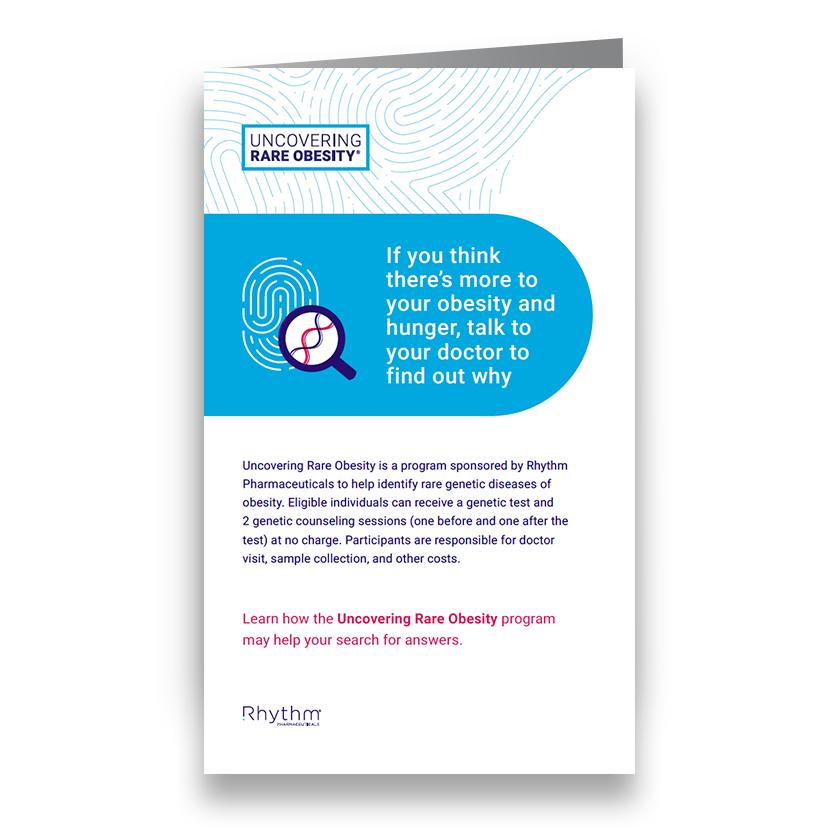
-
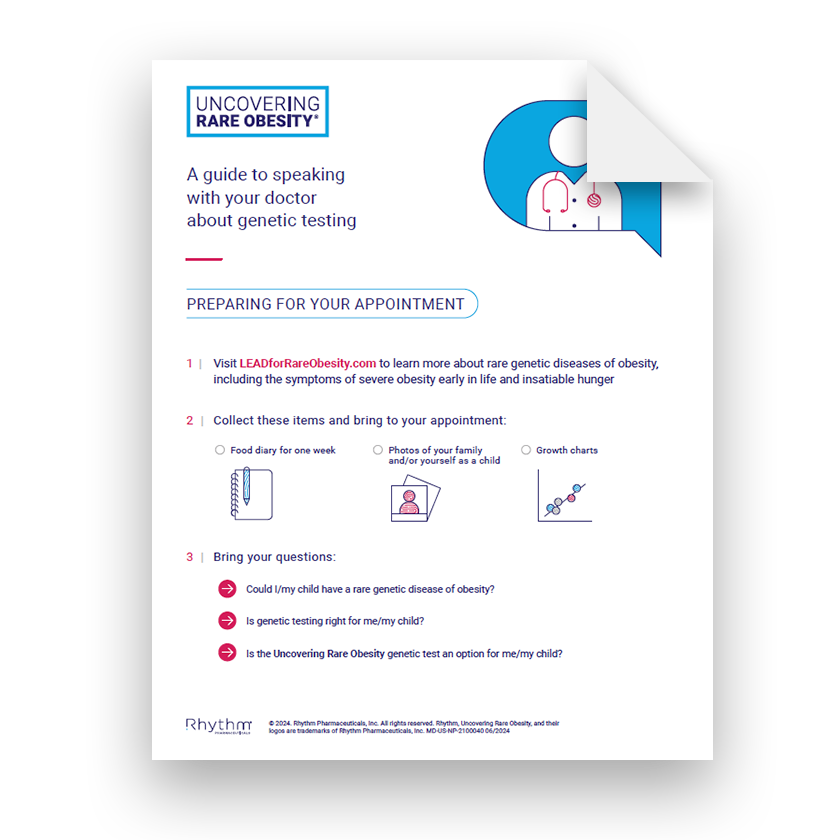
-

-
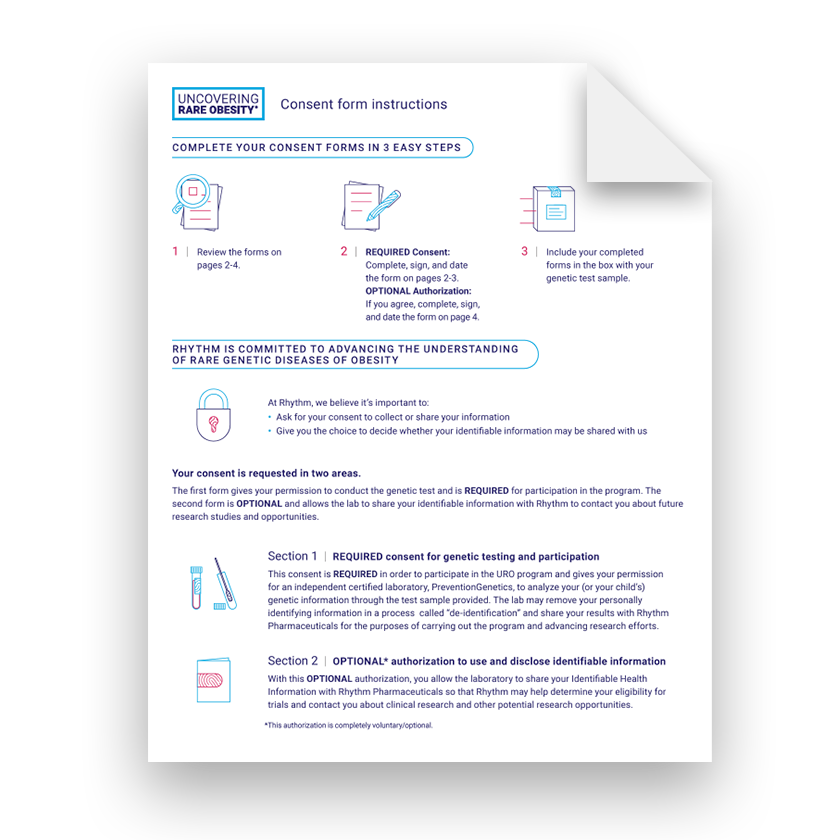
-
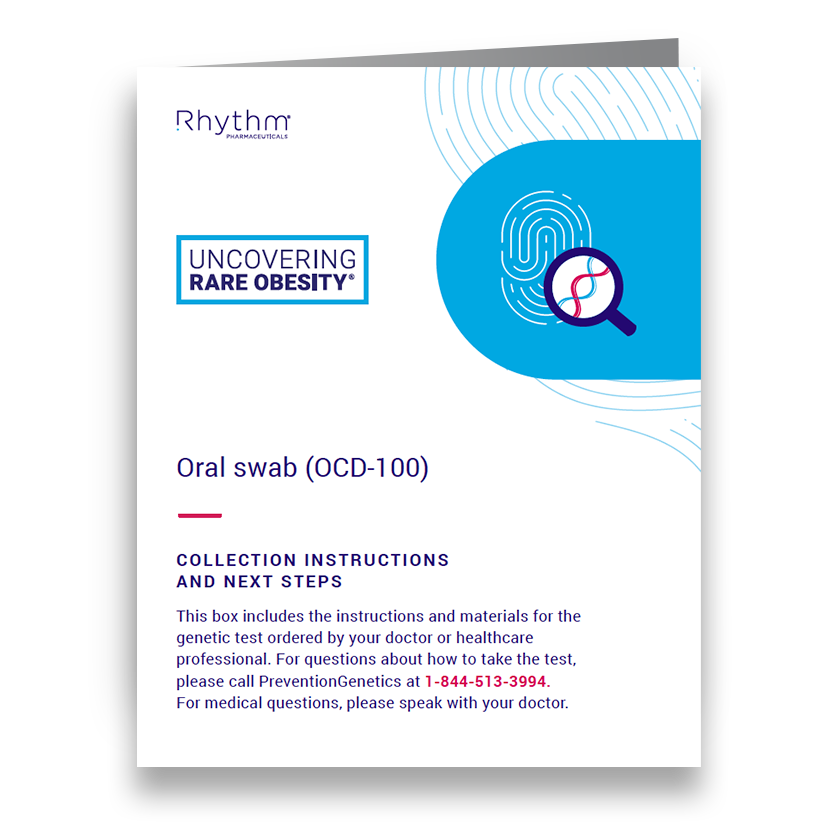 Download Spanish version
Download Spanish versionTake a closer look at the sample collection instructions if you choose to provide your sample from home
-
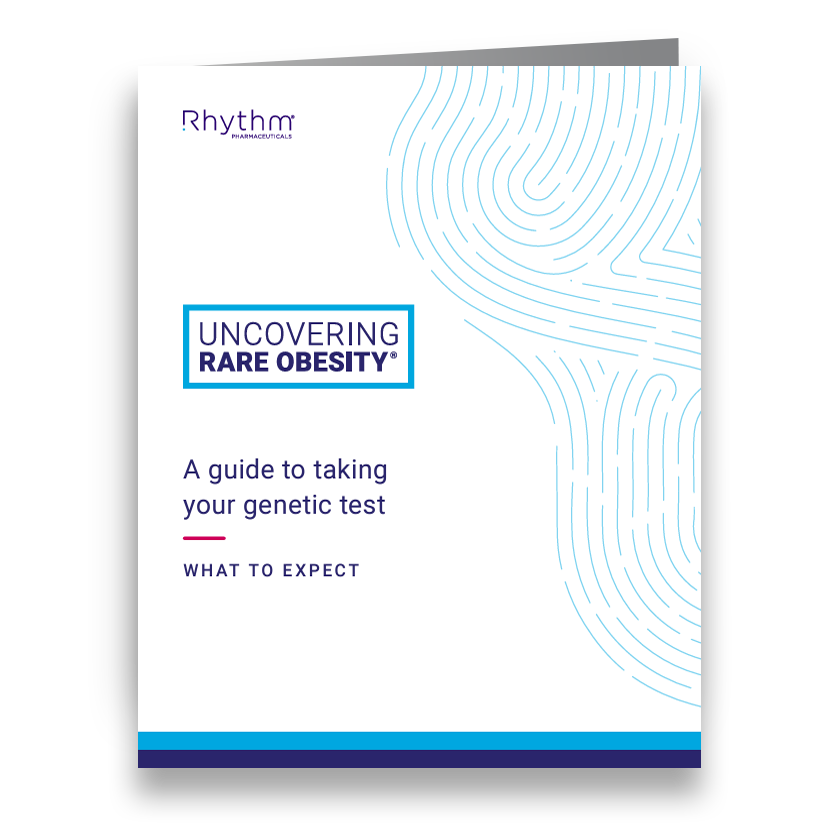 Download Spanish version
Download Spanish versionTake a closer look at the guide included in the test kit you’ll use when you provide a sample at your doctor’s office
Common questions
What is the cost of testing?
Rhythm Pharmaceuticals covers the cost of the test. You are responsible for any office visit, sample collection, or other costs.
What are the reasons my doctor would order the test?
Testing can provide important information for you and your doctor. This information can help inform a possible diagnosis, appropriate disease management and care options, and whether you may be eligible for clinical trials. It may also provide a sense of relief to better understand the cause of your obesity.
Who is eligible?
To be eligible for testing, you must be 18 years of age or younger with a BMI of at least the 97th percentile, or 19 years of age or older with a BMI greater than 40 and a history of childhood obesity. You must also be located in the United States and its territories. Immediate family members of people who have previously been tested and people who have symptoms that suggest Bardet-Biedl syndrome may also be eligible.
What is the sample collection process?
Sample collection can be completed at your doctor’s office via an oral swab or a blood test. You can also use an oral swab yourself from home if you prefer. For more detailed information about the process, watch this video.
Who conducts the DNA testing?
DNA testing is conducted by PreventionGenetics, a clinical laboratory.
How quickly will I receive results?
Test results will be sent to your doctor approximately 3 weeks after the lab receives the sample and completed forms.
What support is available to me for results interpretation?
The Uncovering Rare Obesity program includes two optional, no-cost genetic counseling sessions with a board-certified genetic counselor who can answer your questions before testing and review your results after testing. Interpretation is available for multiple languages.
The session before the test helps to set expectations by discussing the possible risks and benefits of testing and reviewing possible results. The session after the test focuses on explaining your results and how they might impact your health. It also helps prepare you for conversations with your doctor about disease management. To schedule a phone or video appointment, email support@metisgenetics.com or call 1-844-463-8474.
How is my personal information handled?
As part of the testing program, your de-identified (all personal information removed) information will be shared with Rhythm to help better understand genetic causes of obesity.
You may also choose to share your identifiable health information with Rhythm so we can help determine your eligibility for clinical trials and research studies, and share educational information with you.
By agreeing to participate in this genetic testing program, you are helping support research efforts now and in the future.
Where can I learn more about rare genetic diseases of obesity?
Please visit LEADforRareObesity.com for more information about these diseases.
Whom can I contact with questions?
For questions about how to take the genetic test, please call PreventionGenetics at 1-844-513-3994 (Monday – Friday, 9am – 8pm ET).
For questions about genetic counseling, please call Metis Genetics at 1-844-463-8474.
For general questions, please email patientadvocacy@rhythmtx.com.
For medical questions, please speak with your doctor.